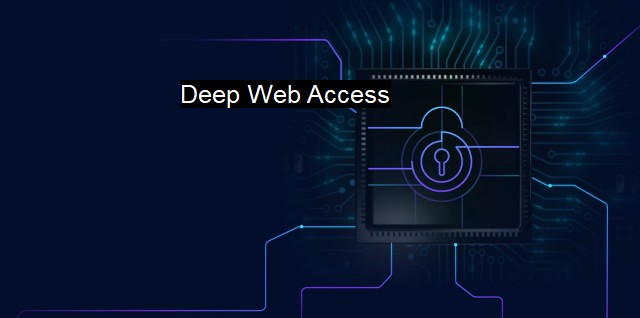What are Deep Web Access?
Exploring the Deep Web: The Role of Antivirus Software in Protecting Against Cyber Threats Beyond Search Engines.
Deep Web Access, also known as invisible web or hidden web, refers to any part of the internet that remains unreachable using standard internet browsers. In contrast to the surface web, which is accessible through everyday search platforms like Google, Bing, or Yahoo, the deep web contains web pages that search engines cannot or have not indexed typically because they are password-protected, encrypted, or because their site operators prevent search engine spiders from indexing them.Understanding Deep Web Access is vital in the world of cybersecurity and antivirus. It is characterized by anonymity, which can be both a blessing and curse. On the bright side, it enables individuals living in oppressive regimes where internet usage is heavily monitored or censored to freely access information without fear of persecution. On the flip side, it provides a safe haven for all manner of cybercrime, including the sale of illicit goods, trafficking, cyber piracy, hacking, and the like.
Anonymity in the deep web is largely achieved through the use of special software that obscures IP addresses, such as The Onion Router (TOR). Individuals and groups that operate on the deep web benefit from this anonymity, making it harder for law enforcement and other authorities to track their activities. Websites in the deep web often use a pseudo top-level domain, .onion, and are inaccessible without using TOR or similar software.
The section of the deep web that grants access to illegal activities is commonly referred to as the dark web – but it is important to note that the terms deep web and dark web aren’t interchangeable. While much of the deep web consists of innocuous platforms like web archives, databases, and members-only websites, the dark web is synonymous with a minimal, yet far more nefarious, section of the deep web.
Deep web access presents significant cybersecurity issues. One is that it serves as a marketplace for the buying and selling of hacking tools and services, testimonies to these services include hacking into social media accounts, databases, and even orchestrating targeted attacks against companies. Cybercriminals can also purchase malware kits and victim’s personal data, making the task of developing and deploying a cyber-attack simpler and more feasible for less technically proficient individuals.
Antivirus also finds its significance tested in the context of deep web access. Cybercriminals on the deep web can commission virus structuring, making new breeds of complex and formidable viruses. Antivirus software continues to be a dynamic field in order to keep up the “virus race” as delivering protection against the most recent threats is essential. This scenario has led to the evolution of antivirus protection from merely providing virus scans to developing sophisticated algorithms to discover and counteract unknown threats proactively.
The security measures provided for deep web access can also be exploited by cybercriminals to launch anonymous attacks against corporations and individuals. This ability to act with impunity makes the deep web a desirable station to host command and control centers for botnets, large groups of infected computers used to perpetrate Distributed Denial of Service (DDoS) attacks, data breaches, and other cybercrimes.
While deep web access offers necessary anonymity for many individuals across the world, it also presents considerable security challenges. The hugely expanding landscape of the cybersecurity world needs to focus on mitigating risks associated with such anonymized access to the internet. As part of that, users also have a responsibility to ensure good cybersecurity habits such as using reliable antivirus software and remaining vigilant for potential threats.

Deep Web Access FAQs
What is the deep web?
The deep web refers to the parts of the internet that are not indexed or searchable by traditional search engines. It includes sites that require specific software or authorization to access.Is it legal to access the deep web?
Accessing the deep web itself is not illegal, but it is important to note that it is often used for illegal activities. It is crucial to practice caution and ensure that you are using the deep web for legal and legitimate purposes.How can I access the deep web safely?
Accessing the deep web safely requires taking several precautions, such as using a virtual private network (VPN) to protect your identity and avoiding suspicious links or downloads. Additionally, it is recommended to use a reputable antivirus software to mitigate potential risks.Can antivirus software protect me from deep web threats?
While antivirus software can provide protection against certain deep web threats, it is important to note that not all threats can be detected or prevented by antivirus software alone. It is crucial to take a holistic approach to cybersecurity and implement multiple layers of protection, such as using a VPN and practicing safe browsing habits.| | A | | | B | | | C | | | D | | | E | | | F | | | G | | | H | | | I | | | J | | | K | | | L | | | M | |
| | N | | | O | | | P | | | Q | | | R | | | S | | | T | | | U | | | V | | | W | | | X | | | Y | | | Z | |
| | 1 | | | 2 | | | 3 | | | 4 | | | 7 | | | 8 | | |||||||